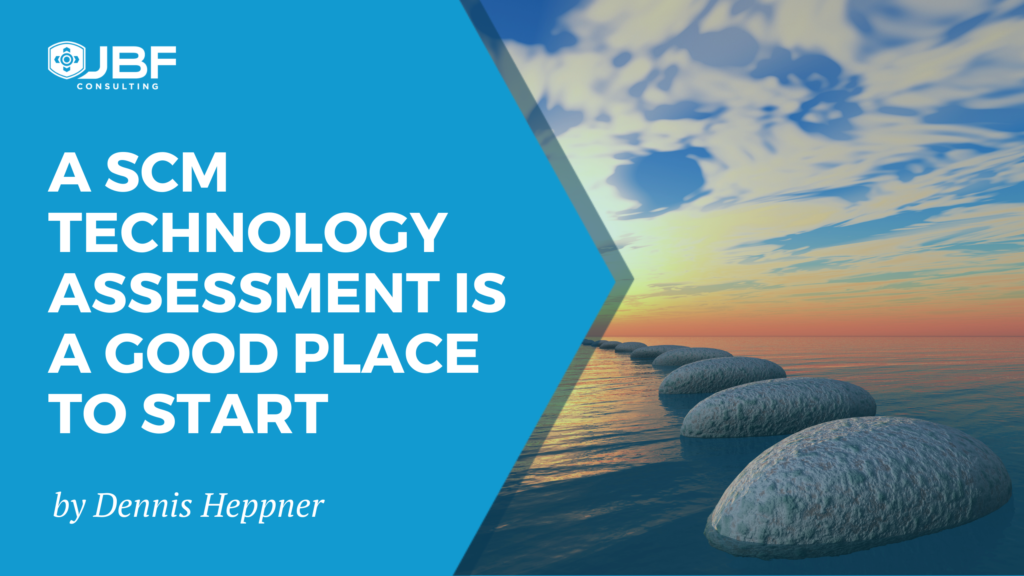
Recently I gave a talk to a group of Executive MBA students at Kent State University. These are working professionals from various fields and industries working to add to their education and experience.
The primary topic was defining Supply Chain Management and current trends that impact businesses and consumers.
As those of us that live in the Supply Chain space everyday know, identifying current trends and issues is a bit like nailing jello to the wall - it is constantly changing and keeping us on our toes - most notably in the last couple years.
“Identifying current trends and issues is a bit like nailing jello to the wall.”
One topic that generated much conversation was the role of technology in supporting supply chain operations. A topic near and dear to the team here at JBF Consulting.
During the session with the students, a question was asked specific to technology investment - something to the effect of…
“I understand the value of SC technology and the pace at which advancements are made, but how does a company know if and when they should invest in new technology?”
A great question, especially one that the supply chain team in an organization will be asked by the one’s making investment decisions.
Key Indicators
Here are a few ‘indicators’:
- The organization is growing quickly and current systems are not keeping pace
- A major shift in strategy will require supporting technology not in place currently (e.g., establishing a brokerage operation as an adjunct to fleet operations)
- Current systems are not reliable or suffer significant down time
- Current systems are no longer supported or updated by the vendor
- Significant manual effort is required to accomplish routine tasks
- Service to customers has suffered because we lack visibility of shipments
Probe Deeper
If one or more of these indicators are painful enough, do we do a quick internet search and start dialing up vendors?
Is it time to run out and buy the SCM technology that is the flavor of the day?
Do we put aside hundreds of thousands, or even millions of dollars, for that tech?
Do we hire a huge, brand name integrator and give them a blank check?
Well, let’s pump the brakes there Turbo.
Haves versus Needs
A very economical and logical start is performing an assessment of what you have and what you need.
Not unlike doing a renovation on your kitchen, there may be elements that are perfectly functional and salvageable (appliances, light fixtures) and others that are worn and dated (floors, cabinets). Then you begin to envision the end state as an educated buyer.
Some benefits to doing an assessment and ‘blueprint’ before going down the ‘all-in’ road are:
- Self-examination is a great learning experience. You may find you have acceptable technology in place, but clunky processes and users are not leveraging the technology
- Developing a roadmap that syncs with your supply chain, and overall business, strategy will garner support and show a logical progression to the desired end state
- You will be forced to make some key decisions that will be drivers of success. For example, do we need a parcel solution now or in a few years when we expect our eComm business to ratchet up?
- You will avoid making a buying decision based on features and functions that the vendor is pushing, and really evaluate true needs
- Likely you will not have buyer’s remorse and be stuck with the wrong solution that was slammed in by your IT team
- The desired end state will be thoughtful vis-a-vis financial outlay, conflicting priorities, and the future of the business
"A ‘quick and dirty’ assessment, followed by a detailed strategy, is a smart investment to begin the SCM technology journey."
In Summary
We often advise our clients that a ‘quick and dirty’ assessment, followed by a detailed strategy, is a smart investment to begin the SCM technology journey. Some clients find that systems just need some TLC; others confirm that a significant transformation is order.
Either way, one has a much better understanding of the work ahead and what the benefits will be. The first step in the journey can be small to ensure we can make larger leaps in the right direction.
JBF is known in the marketplace as a team of experienced (20-25 years on average) professionals that know the logistics technology landscape and implement solutions in a thorough and thoughtful manner. Let us help guide you through the process. It's what we do best!
Dennis Heppner is a Principal at JBF Consulting. Dennis’ expertise in transportation, logistics and supply chain operations, and third-party providers spans 25+ years. His experience is broad-based, spanning entire supply chains, including business process redesign, sourcing, distribution network design, transportation management, distribution operations, outsourcing selection, and business strategy for major manufacturers, distributors, retailers including eCommerce, and service organizations.
About JBF Consulting
Since 2003, we’ve been helping shippers of all sizes and across many industries select, implement and squeeze as much value as possible out of their logistics systems. We speak your language — not consultant-speak – and we get to know you. Our leadership team has over 70 years of logistics and TMS implementation experience. Because we operate in a niche — we’re not all things to all people — our team members have a very specialized skill set: logistics operations experience + transportation technology + communication and problem-solving skills + a bunch of other cool stuff.

